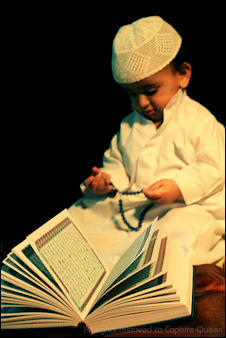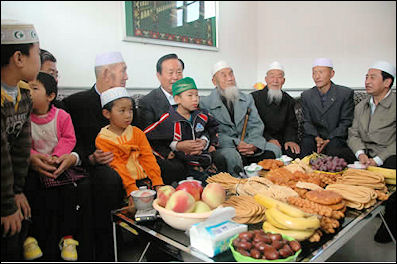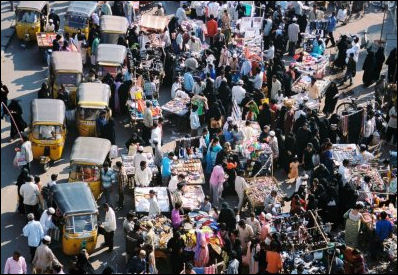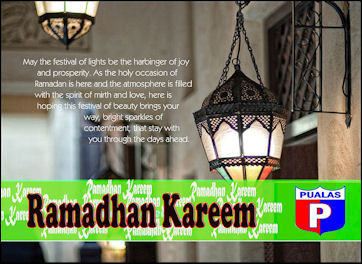Home | Category: Ramadan and Muslim Holidays
RAMADAN ENTERTAINMENT AND SHOPPING

Childhood glory, Happy Ramadan In Malaysia, Brunei and Singapore Ramadan bazaars are popular. Hawkers there sell food and drinks in congested open-air markets or roadside stalls. Muslims often stop there to buy local delicacies before breaking their fast. During Ramadan, street traders in Cairo stack their tables with dates and apricots, sweet fruits to break the fast.[Source: Mariam FAM, Associated Press, April 16, 2020]
In Algeria, Muslim typically receive relatives and neighbours into their homes for tea and cold drinks.In Dakar, Senegal charities hand out "Ndogou", baguettes slathered with chocolate spread, cakes, dates, sugar and milk to those in need at Qur’anic schools and on the street.
According to Associated Press, In Egypt, worshippers fill mosques and shoppers swarm markets. Loved ones gather over delicious iftars. Strangers break bread together in street banquets that feed the needy. Cafes teem with patrons chatting over a cacophony of gurgling water pipes and blaring music. And Ramadan lanterns cast a colorful glow over bustling streets.
“In some areas, a “mesaharati,” bangs on a drum as he wakes up residents for “suhoor,” the pre-dawn meal that will sustain them through another day of fasting. At local mosques, female worshippers hug and chat after the prayers as children scurry around and dates and chocolate are passed from hand to hand.
Many binge watch television shows produced for Ramadan entertainment. One Egyptian woman told Associated Press, she would wake up to have “suhoor” and cook up a storm. Using groceries that she and co-workers had pitched in to buy, she would prepare dozens of meals before she left for work. Before iftar, Selim and other volunteers would go outside to distribute boxes neatly packed with salad, rice, chicken or meatballs. “It’s hard to describe how much goodness and blessings Ramadan brings," she said.
See Separate Articles: RAMADAN: MEANINGS, PRACTICES AND EXPECTATIONS africame.factsanddetails.com ; RAMADAN RULES africame.factsanddetails.com ; FASTING AND EATING DURING RAMADAN africame.factsanddetails.com ; RAMADAN ACTIVITIES, TRADITIONS AND SPECIAL DAYS africame.factsanddetails.com ; EID AL-FITR, THE CELEBRATION MARKING THE END OF RAMADAN africame.factsanddetails.com
Websites and Resources: Islam IslamOnline islamonline.net ; Institute for Social Policy and Understanding ispu.org; Islam.com islam.com ; Islamic City islamicity.com ; BBC article bbc.co.uk/religion/religions/islam ; University of Southern California Compendium of Muslim Texts web.archive.org ; Encyclopædia Britannica article on Islam britannica.com ; Islam at Project Gutenberg gutenberg.org ; Muslims: PBS Frontline documentary pbs.org frontline
RECOMMENDED BOOKS:
“The Moroccan TV during Ramadan: Audience Perception and Expectations”
by Abdelfattah Laabidi Amazon.com ;
“Imaging Muslim Women in Indonesian Ramadan Soap Operas” by Rachmah Ida Amazon.com ;
“Taraweeh in Ramadan: FAQ & A Complete Step-By-Step Guide to Performing Tarawih Prayer at Home” by Amin Dalha Ali Amazon.com ;
“Ramadan and Fasting - Rewards Unlimited” by IqraSense Amazon.com ;
“Ramadan Fasting Recipes for Muslims” by Imam Zakariya Jameel Amazon.com ;
“The Fiqh of Fasting the Month of Ramadan” by Numerous Scholars of Saudi Amazon.com ;
“A Guide to Ramadan and Fasting” by Musharaf Hussain and Abia Afsar-Siddiqui Amazon.com ;
“Ramadan Reflections: A Guided Journal” by Aliyah Umm Raiyaan Amazon.com ;
“Fasting Ramadan While Incarcerated” by Tayba Foundation Amazon.com ;
“Islam's Lunisolar Calendar and the Celestial Year-Clock” by Mark Andrew Brustman Amazon.com ;
“Time in Early Modern Islam: Calendar, Ceremony, and Chronology in the Safavid, Mughal and Ottoman Empires” by Stephen P. Blake Amazon.com ;
“Islam Beliefs and Teachings” by Ghulam Sarwar Amazon.com ;
“Islam Explained: A Short Introduction to History, Teachings, and Culture” by Ahmad Rashid Salim Amazon.com ;
“No God but God” by Reza Aslan Amazon.com ;
“Welcome to Islam: A Step-by-Step Guide for New Muslims” by Mustafa Umar Amazon.com
Partying, Work and Business During Ramadan
During Ramadan it seems everyone works at a slower pace than usual and many people (men especially) use the holiday as an excuse the sit around for hours. Hungry workers don’t accomplish much after one or two in the afternoon. Businesses are only open four or five hours, banks have reduced hours and trading on stock markets is light.
According to some estimates, productivity declines by 25 percent and alcohol consumption is halved during Ramadan. In some places school hours are shortened, shops stay open until right before dawn and doctors and dentists offer appointments until 2:00am.

Hui family in northern China Ramadan is also traditionally a month for weddings, dances and other social activities. There is also lot of soccer playing. During the day the streets are more empty than usual but there is often a festive atmosphere at night. People often take to the streets after consuming the evening meal and party into the night.
Non-Muslims may think of Ramadan as a time of abstinence, but when the cannon booms or muezzin calls an end to the day of fasting, for many it signals time for the parties and feasts to begin. Once the sun goes Muslims are allowed to eat and smoke as much as they want (some also drink alcohol) and think nothing of partying all night and then sleep during the day.♦
Theses days in many parts of the world Ramadan is spent shopping, watching television and eating until the wee hours of the morning and then sleeping much of the day, in some cases until the sunset prayers when the fast is broken.
These days some young people resent that Ramadan has become a time of partying and shopping and trying to get back to the original spirit of the holiday by volunteering during the day, attending religious lectures at night and spending more time reflecting on their faith. One Saudi bank teller told the Washington Post, that what people do today os “not really fasting. Fasting is about feeling your hunger, getting close to God and helping the poor.”
Ramadan Parties and High Living
In 2014, Associated Press reported: “In Bangladesh, where annual per capita income is just $1,190 — among the lowest in the world — upscale buffets during Ramadan can run up to $80 per person. That cost is wildly out of reach for most in the Muslim-majority country of 160 million. "So many parties are around daily as if we are born to eat and eat," complained Sabina Yasmine, an insurance agent in Bangladesh. "People get crazy during Ramadan." [Source: Associated Press, July 26, 2014]
That sentiment was echoed in Cairo, where 24-year-old Rouchane el-Rashidi was dining with friends. She says a lot of people are losing touch with the meaning behind the month. "It's a fact that Ramadan now is more about outings, where we go for iftar and sohour instead of focusing on religion," she said, referring to the sunset and pre-dawn meals.
“Glitzy Arabian Nights-inspired tents have become a staple of Ramadan across the Gulf, with hotel buffets offering fountains of hummus and pyramids of deserts. Fozeya Ibrahim Al Mahmoud of Abu Dhabi's Environment Agency said people are supposed to consume and waste less in Ramadan, but the opposite seems to be happening. Of the total waste produced during the entire year in the small country, 39 percent is of organic materials. During Ramadan, however, the percentage of organic waste rises to 55 percent, he said.
Ramadan Food Waste in the Persian Gulf

Eid crowds in India In Dubai, 1,850 tons of food was thrown out out in Ramadan in 2010, roughly 20 percent of total waste in the emirate during the holy month. Reporting from Dubai in 2011, Jason Benham and Warda Al-Jawahiry of Reuters wrote: “Ramadan brings a huge incease in food waste across the city and the Gulf as leftovers from more lavish banquets attended by the well-to-do are thrown out in a region where soaring summer temperatures mean that fresh food goes off quickly. The amount of food thrown out in the emirate jumps considerably in the holy month — by as much as 20 percent according to Dubai Municipality, with most of the waste comprising rice and non-vegetable foods. Despite the hours of preparation put into the often vast displays of food, waiters at top hotels in Dubai say much of the food left over goes straight into the waste bins. [Source: Jason Benham and Warda Al-Jawahiry, Reuters, August 15, 2011 ^=^]
“In neighbouring Abu Dhabi, the capital of the United Arab Emirates, at least 500 tonnes of food were thrown out on a daily basis during the month Abu Dhabi-based daily the National reported in August last year. Hot and cold — all the food on the buffet gets thrown out,” said a waiter at a five star hotel in Dubai who gave his name only as Nazir, through fear of losing his job, as he went around topping up dishes on the iftar buffet, while businessmen hovered around him, eyeing the vast spread of food on offer. “If people order room service then we’ll make it fresh again. But sometimes we have a lot of waste,” Nazir said. ^=^
“Food experts at top hotels JW Marriott and Hilton in Dubai however say they plan so that no food is thrown out despite preparing up to 15 percent more food during the holy month. “We have control systems that help us avoid excess,” said Simon Lazarus, senior area director of food and beverage, Hilton Worldwide, Middle East and Africa. “Even if there is a little bit left over the staff all eat it. We never recycle food and we have our own strict policy not to.” ^=^
“The large increase in food waste during the holy month has drawn criticism from religious scholars who say that it goes against the spirit of fasting. “Wasting the blessing of Allah, like food, particularly at a time when you see people starving in Ethiopia, Somalia and other places, does not fit in the Islamic notion of moderation. God says in the Qur’an that those who waste the blessing of God, they are the brethren of the devils,” said Sheikh Muddassir Siddiqui, an Islamic scholar in Dubai. “Hotels should cut back on the amount of food they provide. It should not be a matter of prestige. Iftars at hotels should not be intended just for rich people but for everyone - particularly the less fortunate and there are many of them.” ^=^
“One charity that has been looking to help the poor and needy is Hefth al-Ne‘ma — Arabic for “Saving Grace”. Set up in 2004, the Abu Dhabi-based organisation collects leftover food from large gatherings such as weddings, banquets and iftars at hotels in the UAE capital to distribute food that is safe to eat. The charity is hoping to set up operations in Dubai and other emirates later this year its manager Sultan al-Shehi told Reuters. “There are a lot of people who are in need in the UAE and this is an interesting way to bridge the disparity,” said commentator Gergawi.” ^=^
Ramadan Television
 During Ramadan a lot of Muslims sit around and watch television because they can’t work, they have a lot of time on their hands and there are special Ramadan shows . Often the whole family gathers around the television and watching TV becomes a popular social activity.
During Ramadan a lot of Muslims sit around and watch television because they can’t work, they have a lot of time on their hands and there are special Ramadan shows . Often the whole family gathers around the television and watching TV becomes a popular social activity.
During Ramadan viewership soars after Muslims break the daylong fast. It's like the Super Bowl for advertisers. Some people binge watch their favorite series. Special television soap operas are released just for Ramadan. The most watched one are produced in Egypt. These are mostly miniseries called “musalsalat” “similar to Latin America telenovelas. They are relatively high budget projects with big name stars, belly dancers, lavish sets, lots of extras and complicated and often racy plots with in-for-face moral messages.
Popular “musalsalat” include historical costume dramas about famous Islamic figures like “The Women of Islam” , set in the 13th century, and sexy melodramas like “Tales of a Modern Husband” , full of class conflict and intrigue. “We Dream of Tomorrow “ was about a wealthy man who kills a man in a car accident and then pays for an operation to cure his mother of blindness. "Bab el-Hara", set in France-controlled Syria, was about Arab freedom fighters trying to free imprisoned comrades while trying to evade French soldiers.
In Egypt, the iftar meal to break the fast is followed by everyone gathering around the television to watch the featured “musalsalat” . Men go out to watch the same miniseries at the local tea house with their friends. Some musah run through daybreak and are not over until after the break meal. Some conservative Muslims don’t like the “musalsalat”, saying the passion for soap operas demeans Ramadan.
Ramadan Egyptian Soap Operas
Ramadan has also been a time when people watch a lot of television. Some of the most popular shows of the year run during that time. Egyptian soap operas are particularly associated with Ramadan TV. Nasry Esmat wrote in the Los Angeles Times: “The fierce competition between TV channels in Egypt to win audiences and advertising money during the Islamic holy month of Ramadan bombards Muslims with soap operas and historical dramas that distract them from performing their religious traditions. Ramadan began as Egyptian TV and independent satellite channels began showing 48 new soap operas and nearly the same number of other programs produced specially for the holy month. [Source: Nasry Esmat, Los Angeles Times, August 14, 2010 ~|~]

Ramadan soap opera poster about an Egyptian-Jewish love affair
“Statistics from the Pan Arab Research Center (PARC) show that Ramadan is the advertising high season in Egypt, with $146 million spent during the holy month last year, a remarkable 62% increase over any other time of the year. Millions of Egyptians watch soap operas after breaking their fast after sunset and before beginning it again after morning prayers. “Egypt is one of the fastest-growing advertising markets in the world,” Reg Lascaris, the president of the advertising group TBWA in the Africa, Middle East and Mediterranean region, told The National newspaper. ~|~
The big spending on advertising during Ramadan inspired Egyptian TV to launch a new channel called “Drama 2.” Tarek Nour, owner of an advertising agency and a veteran in the industry, launched “Cairo and People”, a channel that broadcasts only during Ramadan. The indulgence of escaping into soap operas and other TV shows is seen by many religious leaders as a threat to the spiritual value of the holy month. “Ramadan is a worship month, not a month for watching soap operas” Ahmed Hemaya, the Imam of Sultan Hassan mosque in Cairo – one of Egypt’s oldest mosques --said in a recent interview with Egyptian TV. “Fasting teaches us patience and to control our desires and instincts … over-watching TV distracts many Muslims from Tarawih prayers,” the imam added.” ~|~
Ramadan TV Series Sympathetic of Jews Angers Viewers
In 2020, Joseph Krauss of Associated Press wrote: A television series aired by a Saudi broadcaster during the Muslim holy month of Ramadan has sparked controversy by offering a positive depiction of a Jewish community in the Gulf at the time of Israel's creation. Critics say it and another series aired on the network promote normalization with Israel even as the Palestinian cause is under threat. “Relations between Israel and Arab Gulf states have quietly improved in recent years as they have come to see Iran as a shared threat. Most TV shows in the Arab world are made by private companies, but producers must heed red lines set by the region's autocratic rulers.[Source: Joseph Krauss, ,Associated Press, May 3, 2020]
““Umm Haroun,” Arabic for the mother of Aaron, is set in an unnamed Gulf country in 1948, when Israel declared its independence and fought a war with Arab states. At that time, Jewish communities, some with ancient roots, could be found across the Arab world. The show portrays Jews and Muslims living together in peace and even features a romance between a Jewish woman and a Muslim man. Relations deteriorate after the creation of Israel, when some Jews rally to the Zionist cause and Muslims side with the hundreds of thousands of Palestinians who fled or were expelled from their homes in 1948.
Another Saudi-made series, “Exit 7,” has also struck a nerve. A clip shared widely on social media features a debate between two main characters in which one defends the Palestinian cause while the other says he would be happy to do business in Israel. He accuses the Palestinians of being ungrateful for Saudi support and says they would attack the kingdom if they could. The shows have prompted online calls for a boycott of MBC, the private, Saudi-owned satellite channel airing them. The Cairo-based Union of Arab Television Producers said they should be cancelled, calling them “cheap works” meant to "brainwash" the Arab people.
“The makers of “Umm Haroun” insist they have no political agenda. “I wanted to write this drama to deliver the message that our societies were much more tolerant than they are today, and people should go back to the same values,” Ali Shams, the head writer, told The Associated Press. “We differentiate between Jews and Israel,” he said. “Israel occupied Palestine and committed atrocities against the Palestinian people.” Producer Emad al-Enazy said the series was developed by MBC as well as Kuwaiti and Emirati production companies, with no governments involved.
Ramadan Boon for Retailers

Ramadan in Jerusalem
Ramadan is a boon for retailers in the Middle East, South Asia and beyond. While some Muslims welcome it as a positive sign, others see it as commercialization of a sacred time of year, threatening to subvert its very nature. According to Associated Press: “Glitzy billboards in the Middle East and postage stamps in the U.S. Advertisements for lingerie and sales on modest skirts. Lavish buffets and cellphone apps. Ramadan, Islam's holiest month, is a boon for retailers in the Middle East, South Asia and beyond. And while some Muslims welcome it as a positive sign, others see it as commercialization of a sacred time of year. [Source: Associated Press, July 26, 2014]
The biggest commercialization of Ramadan is concentrated in countries where Muslims are in the majority. The streets of major cities in the Middle East and South Asia are filled with billboards about Ramadan. One McDonald's ad in Islamabad shows a mosque calling on people to "Dine Divine." Carmudi, a website for buying and selling cars, said it is offering a variety of deals for residents of the United Arab Emirates "to celebrate the holy spirit of the season. So dig into your pockets."
Luxury brand Montblanc urged customers to "celebrate Ramadan in its true spirit with an exciting range of gifts." The trendy Sauce boutique in the Emirates sells bejeweled Ramadan-themed purses. One evening clutch cleverly takes the shape of a can of fava beans, or ful — a staple of pre-dawn meals. Another Dubai boutique has Ramadan-inspired T-shirts that cheekily say "Bad Girl Gone Good." Cairo supermarkets also carry Ramadan-themed towels and a range of lanterns, or fawanees, used to decorate the home.
Muslims Condemn the Commercialization of Ramadan
Abdur Rashid, who heads a mosque in Bangladesh, said such consumption does not represent the tenets of his faith. "Islam has not taught us this," he said. Scholars also are disturbed by the proliferation of evening TV shows during Ramadan. In Pakistan, live game shows give away gifts promoting their sponsors. In the Arab world, soap operas starring Egypt's top actors rake in hundreds of millions of dollars in advertising.
Sheik Abdullah Roshdi, who heads a Cairo mosque, said Ramadan should heighten feelings of patience, empathy and compassion for others. He said people should be spending their time doing acts of charity, and remove themselves from that which is unnecessary to attain the ultimate prize of heaven in the afterlife. "Now the month of Ramadan has been transformed from a season of spiritual ascension ... into following desires and luxuries, and we totally oppose this," he said.
Image Sources: Wikimedia Commons
Text Sources: Internet Islamic History Sourcebook: sourcebooks.fordham.edu ; Arab News, Jeddah; “Islam, a Short History” by Karen Armstrong; “A History of the Arab Peoples” by Albert Hourani (Faber and Faber, 1991); “World Religions” edited by Geoffrey Parrinder (Facts on File Publications, New York); “Encyclopedia of the World’s Religions” edited by R.C. Zaehner (Barnes & Noble Books, 1959); Metropolitan Museum of Art, Encyclopedia.com, National Geographic, BBC, New York Times, Washington Post, Los Angeles Times, Smithsonian magazine, The Guardian, Al Jazeera, The New Yorker, Time, Newsweek, Reuters, Associated Press, AFP, Library of Congress and various books and other publications.
Last updated April 2024
